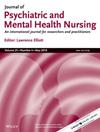Assessing the impact of long-acting injectable compared to oral antipsychotic medications on readmission to a state psychiatric hospital
Abstract
What is known on the subject
- People living with schizophrenia spectrum disorder (SSD) have a higher death rate which is caused, in part, by poorer adherence to treatment as compared to those with other mental illnesses.
- Using long-acting injectable antipsychotic (LAI) medications can improve medication adherence and reduce hospitalizations for people living with SSD but are often underutilized.
What the paper adds to existing knowledge
- As compared to oral antipsychotic medications provided to patients with SSD at discharge from a psychiatric hospitalization, being provided with an LAI antipsychotic medication may reduce subsequent rehospitalization.
- Specifically, patients discharged on an atypical or second-generation LAI medication are less likely to be readmitted to the hospital when compared to those discharged on a typical first-generation oral medication.
What are the implications for practice
- Because LAI antipsychotic medications are often underutilized as treatment options, the study findings suggest that this modality may be considered for patients with SSD when being discharged from a psychiatric hospitalization.
- Ideally, psychiatric-mental health nurses can educate patients about indications, benefits, and risks of using atypical or second-generation LAI antipsychotic medications during hospitalization and at discharge prevent the risk for future rehospitalizations.
Introduction
People living with schizophrenia spectrum disorder (SSD) have poorer medication adherence compared to those with other mental illnesses. Long-acting injectable antipsychotic (LAI) medication use is associated with greater adherence, reduced re-hospitalizations, and improved recovery outcomes when compared to oral formulations.
Aim
To compare LAI antipsychotic medication use versus oral formulations on readmission to an inpatient hospital.
Method
Medical records (N = 707) from a state psychiatric hospital in the southern region of the United States were reviewed. Controlling for demographic variables, logistic regression analyses were used to examine LAI compared to oral formulations on readmission.
Results
Compared to patients discharged with oral antipsychotic medications, those with LAIs had a lower proportion of readmission rates in 6-month and 1-year periods, but not 30-day or 2-year periods. When controlling for demographic variables, those discharged with an atypical LAI had significantly lower odds of being readmitted within the 24-year period compared to those discharged on a typical oral antipsychotic.
Discussion
Compared to orals, LAIs do not increase and may mitigate readmissions to psychiatric hospitalization.
Implications for Practice
Psychiatric-mental health nurses and other professionals may recommend LAIs when indicated for those with SSD.

 求助内容:
求助内容: 应助结果提醒方式:
应助结果提醒方式:


